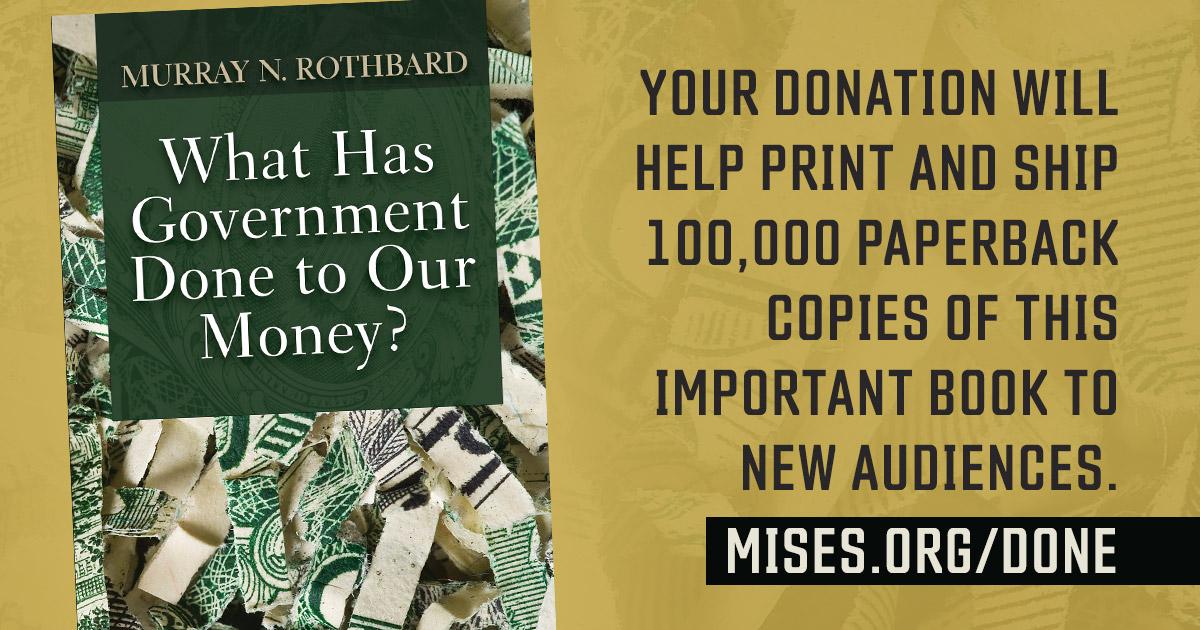
The weaponization of money is the issue of our time. The politicization of the dollar doesn’t only make us poorer; it empowers the evilest actors in society and undermines the most important foundations of civilization.
As Dr. Ron Paul has noted, “It is no coincidence that the century of total war coincided with the century of central banking.”
This year marks the sixtieth anniversary of Murray Rothbard’s classic work What Has Government Done to Our Money?, and this is still one of the most important questions we can ask today. We need your help getting this book into the hands of a new generation. Our new edition has a preface by Guido Hülsmann, a foreword by Patrick Newman, and an afterword by Joe Salerno.
Your donation will help print and ship 100,000 paperback copies of this important book to new audiences.
The message of What Has Government Done to Our Money? has never been more important. Polls of all kinds show the youngest generation of Americans—on both the left and right—are conflating perverse Fed-fueled financialization, cronyism, bailouts, and the rise of state-backed corporate tyranny with capitalism. This is wrong.
On the left, we have seen that anger against a mistaken view of capitalism translates into a generation of politicians fundraising on reviving socialism as a solution for everything from “global warming” to whatever new “civil rights” agenda has been declared the trendy issue of the moment, preying upon the hysteria pushed in government schools. That these issues are echoed proudly by America’s largest companies, including the most prominent members of the military-industrial complex, is an irony lost on those devouring this content on social media.
On the right, we see appropriate outrage directed at the scourge of “woke capital” but also the Great Reset translated into a new version of the antimarket “conservatism” that Hans-Hermann Hoppe has condemned as modern National Socialism. Just as the conservative movement of the twentieth century was betrayed by former Marxists promoting an authoritarian state at home to defeat communism abroad, an organized anticapitalist intellectual movement is trying to pin our public-private tyranny on “market fundamentalism” rather than the corruption of markets due to the socialization of money and credit by the Federal Reserve and its fellow central banks.
The work of Murray Rothbard, who understood the importance of a populist backlash against the elite, is vital to punching through these false narratives. What Has Government Done to Our Money? is an essential tool in this intellectual battle.
In recent years, the Mises Institute has excelled at distributing important books across the country. Thanks to our generous donors, we unleashed 100,000 copies of Henry Hazlitt’s Economics in One Lesson.
We gave these books to college groups, homeschooling groups, civic clubs, moms, dads, and entrepreneurs. Now it’s time to print and distribute 100,000 copies of What Has Government Done to Our Money?
Stop for a minute and think about the impact of 100,000 young people, students, and professionals reading Murray’s important lessons on money. The information this book holds is heresy at virtually all American colleges. That’s why it’s the Mises Institute’s responsibility to get this book, and others like it, into the hands of as many young people as possible.
What has made Rothbard’s short, easy-to-read book so powerful is how effectively it communicates the importance of money and why the state is so desperate to control it. It’s why What Has Government Done to Our Money? was one of Dr. Paul’s most recommended books during his heroic presidential campaigns and why it remains one of the primary books that draws new minds to the works of the Mises Institute.
A new preface, foreword, and epilogue will frame this classic as essential reading for understanding the modern state. Already we have seen the impact of Rothbard’s timeless work in cultivating a generation of modern economists that have been able to see through the “Fedspeak” and warn individuals, in America and beyond, of the consequences of the state’s control of the dollar.
For example, it was Austrian scholars like Mark Thornton who in the 2000s identified the disastrous housing bubble that resulted from Greenspan’s monetary intervention and helped spark a global financial crisis. Ron Paul used his seat in Congress to condemn Ben Bernanke’s response to that crisis, which sparked the greatest debt bubble the world has ever seen with hyper-low interest rates and a massive expansion of the Fed’s balance sheet. It was Ryan McMaken and others on the Mises Wire who warned of the consequences of covid-era Fed policies, which grew the balance sheet even higher and, coupled with the disastrous Friedmanite idea of “helicopter money,” have resulted in the historic inflation we see today.
The government captured the money, and we are dealing with the consequences: an eroding dollar, zombie companies addicted to low-interest loans, the socialization of the housing market through the Fed’s purchasing of mortgage-backed securities, the consolidation of corporate power in regime-friendly institutions, and a generation of young people that are suffering from lower job prospects and delaying starting families.
What has the government done to our money? It has made the elite and politically connected richer. It has made working Americans poorer. It has made the state more powerful than it has ever been.
The lessons of What Has Government Done to Our Money? have awakened millions around the world to the dangers of central banking. Not only has it been translated around the globe, but it has helped spark tremendous interest in alternatives to state-controlled money like gold and crypto. As the weaponization of the dollar has proven to be the top tool DC uses in foreign policy, we’ve even seen other nations explore dedollarization to protect themselves from the manipulation of the Washington regime.
With your help, we can get this important book to thousands of young people around the country looking for answers to the problems their generation has been left with. A new sixtieth-anniversary edition of this classic will ensure that Rothbard’s analysis of the dollar remains one of the most recommended on the topic and will help continue to grow his legacy as essential reading to understand the true nature of the American empire.
But we need your help. Money raised for this project will not only go to the costs of production and printing but also to the promotion of this book to new audiences not familiar with Austrian economics and the Mises Institute. Every dollar is an investment in a future free of the regime’s capture of our core economic institutions. That’s an investment that the Fed can’t inflate away.
Please contribute today.




